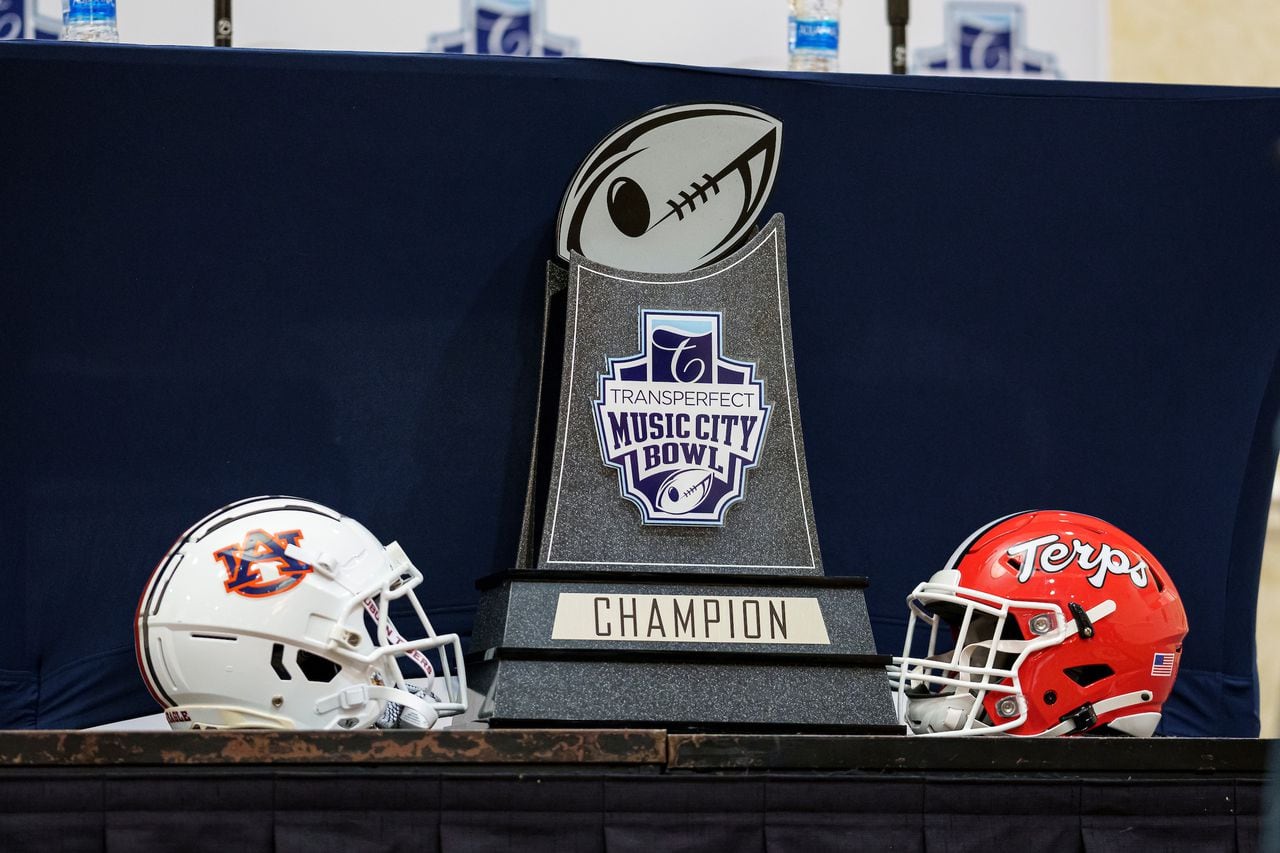Auburn, Marylandâs use of helmet tech in Music City Bowl previews a future change
The 2023-24 bowl season is allowing teams flexibility to experiment with new communication technology in response to a regular season shadowed by a sign-stealing scandal at Michigan.
In response to the news out of Michigan’s program, coaches across the country have mentioned in-game sign stealing as a frequent practice. It’s as simple as looking across the field in hopes of figuring out what an opponent is doing. Nothing illegal there.
But college football is archaic relative to the NFL with regard to communication between the coaches on the sideline and players on the field. Before bowl games this year, teams had not been allowed to use radios in player’s helmets to hear from coaches or tablets on the sideline to look back at a previous possession.
The NFL has allowed both those uses for years.
The Music City Bowl — which kicks off at 1 p.m. Saturday at Nissan Stadium in Nashville between Auburn and Maryland — is one of 14 bowl games that will experiment with the NFL’s commonplace helmet communication technology, according to a report from Yahoo! Sports’ Ross Dellenger.
Given the allowance to experiment with that type of technology in helmets during the Music City Bowl, Auburn is foregoing the opportunity while Maryland will use it.
Dellenger reported that none of the bowl-eligible SEC teams will use the radios inside player helmets during their respective postseason games.
If the use of in-helmet technology becomes a permanent change, Freeze wants to have the whole offseason to prepare for it.
But he wasn’t opposed to Maryland experimenting with it on the opposite sideline.
“Then when I heard we had the opportunity to utilize the coach-to-player communication as well as the iPad stuff on the sideline, I called Hugh and said I think at least something we should think about doing because it gives us the chance, if it goes into play next season to see how it works and work out the kinks,” Maryland head coach Mike Locksley said during a joint-press conference with Freeze on Friday before the Music City Bowl.
“Locks called me, and I immediately said absolutely, man. Let’s do that. I have zero problem with them doing that,” Freeze responded later in the press conference.
Locksley said the use of in-helmet communications was discussed at the Big Ten coaches’ meeting in Chicago before the 2023 season — and before news broke of Michigan’s, a Big Ten program, sign stealing.
He said the technology was not implemented for 2023 because the conversations regarding it happened too close to the start of the season, rendering it impossible to make the change in time.
“It’s been great to have for the last couple of weeks in practice,” Locksley said. “It’s a little different. For us, it gave us an opportunity to kind of see how it worked. So it will be interesting to see what advantages it gives us, especially playing young players. I think it will be great for us on Saturday to be able to coach them through games during the course of a game.”
While Auburn is not using the radios in its helmets, it will be using tablets on the sideline in order to help its players, especially quarterback Payton Thorne, get immediate feedback on their play.
“I think it could be cool for college football,” Thorne said Wednesday. “College is kind of behind the NFL and high school in terms of technology usage. The biggest thing I want is the iPads, or the Surfaces, on the sideline. I think we have that, so that’s what I heard. That’d be cool to see next year for college, but I don’t know where all that stands, to be honest.”
It is not yet clear if the technology will become a permanent addition to the sport. Dellenger reported that the SEC and Big Ten — the two most powerful conferences in college football — were the leagues pushing hardest before the season to make a long-term change.
Though while Auburn isn’t taking full advantage of it now, Freeze said he still hopes technology mirroring that of the NFL will be a part of the college game in the future — as long as it is done safely.
“This is kind of an ‘above me’ discussion,” Freeze said Wednesday. “Truthfully, the idea alone, with us being able to communicate with our quarterback, I like. I think it’s something that will help with some of the signal issues we’re having, and obviously, everybody’s trying to pick off your signals during games. It’s just part of the game. But I do think that can help.”
Matt Cohen covers Auburn sports for AL.com. You can follow him on X at @Matt_Cohen_ or email him at [email protected]
